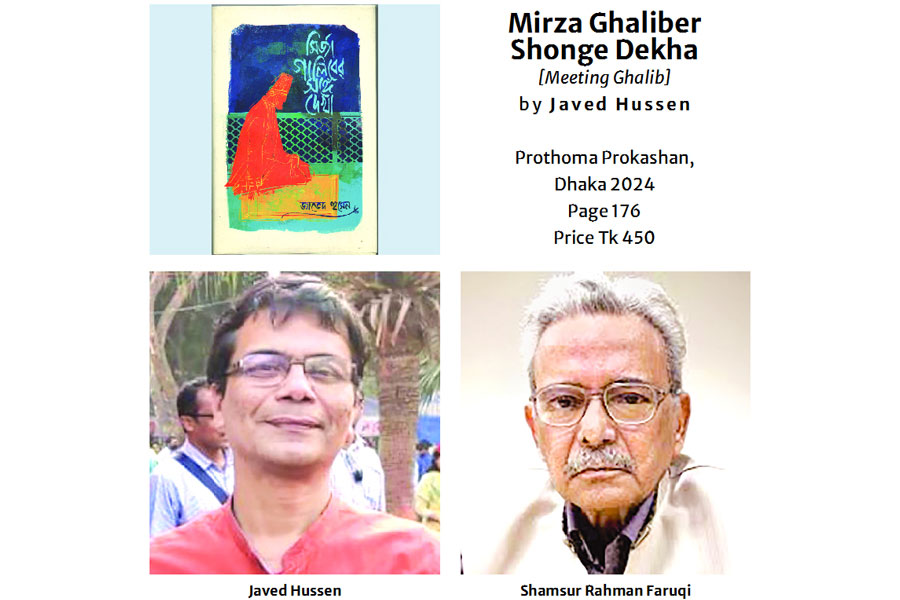
Published :
Updated :

It is a must-read tale of Beni Madhav Rusava, a Rajput-descendant who lives in Azamgarh in Uttar Pradesh, India. Being an enthusiastic youth, he closely watched the great revolt in 1857 against the British rule in India and participated in one stage. As the British ruthlessly suppressed the rebellion and killed thousands of rebels who had fought for the independence of Hindustan, Rusava also went into hiding to save himself. As the dust settled gradually, the young man also came out looking for a job and starting a new life as he had already lost his family members. Inside him was a flame of poetry that ultimately drove him to Delhi to find and meet Mirza Ghalib.
Javed Hussen presents the tale in his fascinating fiction titled Mirza Ghaliber Shonge Dekha (Meeting Ghalib). Interestingly, the author takes the cue for his fiction from a story titled Ghalib Afsana, written by eminent Urdu poet, fiction writer, and critic Shamsur Rahman Faruqi. He used the pseudonym Beni Madhav Rusava, also the narrator of the story, while writing the story. As the narrator, Rusava provides a unique perspective on the events and the cultural and linguistic changes that took place during the British rule in India.
The writer depicts a painful time when the British, who entered as traders and turned rulers, aggressively started undermining the tradition of cultural harmony in Hindustan by enforcing a divide-and-rule policy. This policy, a strategy of maintaining control by creating divisions among the subjects, was used to sow discord among the diverse communities of India. As the great rebellion of 1857, also known as India’s first war of independence, heavily shook the foundation of East India Company’s rule, the British government directly took control of its most resourceful colony. A series of measures had also been taken to consolidate the previous 100 years of British rule through the company and distort the heritage of language, literature and culture. One such step was dividing a strongly flourished Hindustani language between Hindus and Muslims. The language was initially known as Hindvi and Hindustani with Perso-Arabic script and was heavily influenced by Persian. Having emerged during the 12th century in northeast India, the British-backed effort helped it to emerge as Hindi, which uses Devnagari script with Sanskrit influences. With Perso-Arabic script and Persian influence, the original form of the language is renamed Urdu. The British successfully established the proposition that Urdu is for Muslims and Hindi for Hindus. They also propagated that Urdu means army camp, and the language originated in Mughal army camps. In the book, Rusava wonderfully describes the story of the Hindi-Urdu divide.
Javed Hussen, with his profound knowledge of Urdu and Persian, skilfully deconstructs and reconstructs Faruqi’s original story, adding his own unique perspective and expanding on many aspects in his own language. His extensive work in Urdu poetry and literature, including translations of Ghalib’s works into Bangla, has equipped him with the necessary tools to create a new fiction for Bangla readers, particularly those who admire Ghalib and Urdu literature. His expertise and deep understanding of the subject matter instil confidence in his readers, assuring them of a rich and authentic literary experience.
The British razed houses and other structures of old Delhi, known initially as Shahjanabad, after 1857 to erase the history and heritage developed over the centuries, especially the Mughal era. Mirza Gahlib, the most famous and popular Urdu poet in the world, was an eyewitness to the destruction and survived the turbulent time. His fame was, however, not eroded, and he became one of the last icons of the glorious history and heritage. Rusava took a troublesome journey from Kanpur to Delhi to meet Ghalib. During his journey, Rusava closely watched the barren Delhi where Red Fort, Jama Masjid and Chandni Chawak appeared as plundered sites.
Despite the British atrocities, the people of Delhi refused to be subdued. They sought to revive their lives and works, and one of the most powerful expressions of this revival was the colourful mushaira that Rusava was able to join. This event, where Urdu poets gathered to perform their works, is a symbol of hope and resilience, and its vivid description will surely inspire the readers.
The book is a testament to the power of literature to transcend reality. It is a colourful mixture of truth and imagination, a blend that has elevated it beyond mere fiction. This blend offers deep insights into historical transition and cultural diversion, and the joys and sorrows of those who are proud of their harmonious common heritage in Hindustan. The vivid description of this blend will surely intrigue the readers, leaving them eager to delve deeper into the narrative.
asjadulk@gmail.com


 For all latest news, follow The Financial Express Google News channel.
For all latest news, follow The Financial Express Google News channel.